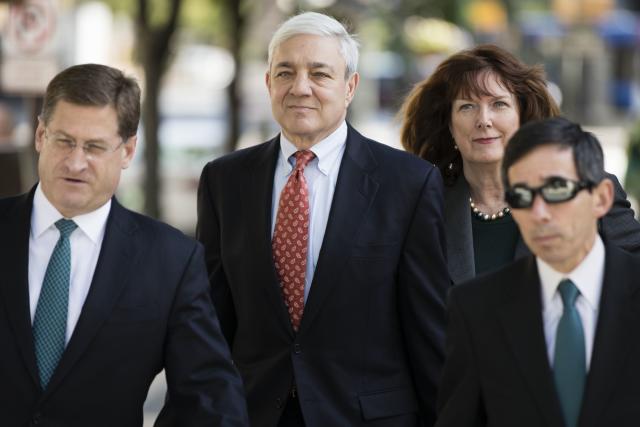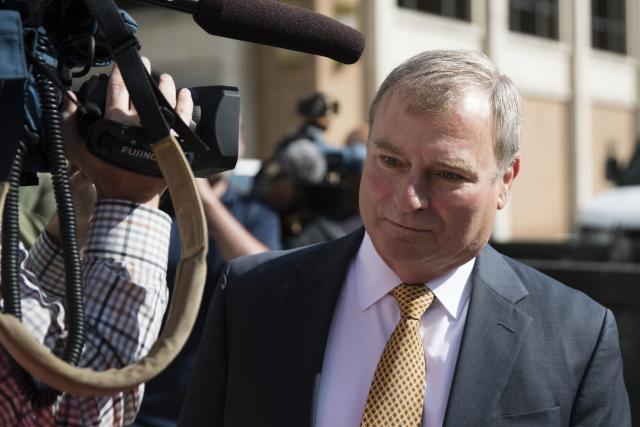Five years and seven months after Jerry Sandusky was indicted for child molestation, a scandal that would rock Pennsylvania State University to its core, three administrators are headed to jail.
Dauphin County Judge John Boccabella sentenced former school president Graham Spanier to two months in jail followed by two months house arrest on Friday morning in Harrisburg, Pennsylvania. Former vice president Gary Schultz also received two months in jail and at least four months of house arrest. And former athletic director Tim Curley received three months in jail and at least four months of house arrest. Each man will also pay fines and owe 200 hours of community service.
The day was long delayed, yet no less significant.
It serves, perhaps, as a closing chapter in a sordid scandal that uncovered a slew of victims in Sandusky’s wake and overwhelmed the once-pristine image of Joe Paterno’s football program. Paterno was fired days after the indictment and died months later.
In the years since millions of dollars have been handed out in civil settlements. NCAA sanctions came and went. And parts of the Penn State community has been forever divided – in urging for prison time, the attorney general cited pro-Sandusky forces who mock victims’ stories and lifestyles both online and in person. It’s been that tumultuous.
www.gofundme.com
Schultz and Curley pleaded guilty to endangerment after failing to report to child welfare authorities after Sandusky, a former defensive coordinator, was reported to have showered with underage boys in a Penn State locker room. Sandusky was convicted on 45 counts of sexual molestation in 2012 and is serving a sentence of up to 60 years.
www.gofundme.com
Schultz and Curley pleaded guilty to endangerment after failing to report to child welfare authorities after Sandusky, a former defensive coordinator, was reported to have showered with underage boys in a Penn State locker room. Sandusky was convicted on 45 counts of sexual molestation in 2012 and is serving a sentence of up to 60 years.

As part of their plea, both Schultz and Curley testified for the prosecution in Spanier’s trial earlier this year on similar charges. A jury found Spanier guilty of misdemeanor child endangerment while acquitting him of more serious felony charges.
The fall is considerable for Spanier, whose influence extended nationally through his work on various educational groups and as a chairman of the NCAA Board of Directors. He was known among his peers, few of whom lack ego of their own, as a big personality who enjoyed lecturing others, the proverbial smartest man in a room of smart people.
He was so convinced of his innocence that he and his attorney called no witnesses and presented no defense at his trial. They completely misread a jury dealing with an emotional case that was under pressure to find him guilty of something.
Spanier has vowed an appeal but he’ll have plenty of time now to regret that decision.
He’s gone from a high-paying, highly regarded career to just another inmate, headed to the state pen where he’ll be out of his element and known as Jerry Sandusky’s protector.
It’s the same for Schultz and Curley, career administrators who were respected in their fields. To this day, longtime coaches at Penn State can’t fathom how Curley, in particular, ended up with such a fate. Both men apologized to the victims at Friday’s sentencing.
The answer is not so much in the hyperbolic cries that the men were evil – it is almost unfathomable the three saw no issue or in any way supported Sandusky abusing children. This is more about a failure to take allegations seriously, to act significantly when confronted with a crisis and a base of ignorance about how to stop a monster such as Sandusky.
If there can be any good that comes from this story, it’s that others educate themselves on how to act. None of these three set out to be sent to prison and become known for enabling a pedophile.
Their downfall is based on a simple timeline. In 1998, local authorities investigated Sandusky after a mother reported he had showered with her 11-year-old boy after a workout in the Penn State weight room. The boy said Sandusky had lathered him up with soap and bear-hugged him from behind as he lifted the boy to be closer to the shower head.
The 1998 investigation ended without charges. The district attorney didn’t feel he had enough evidence to win a conviction. Sandusky wept over the allegation and told authorities it was an innocent mistake. For the administrators, there wasn’t much that could be done.
However, in 2001, then-Penn State graduate assistant Mike McQueary reported he walked into the coaches’ locker room late on a Friday night to find Sandusky and a boy showering. He told Paterno the next day. Before his death, Paterno testified he was told it was “sexual.” Paterno promptly reported it to Curley and Schultz. Those two hired a law firm that afternoon, a Sunday, for what legal notes said was “a possible abuse” case.

Yet little to nothing happened. The administrators didn’t call the police. They didn’t go seeking the boy. They didn’t immediately bring in Sandusky. They didn’t even meet with McQueary for two weeks. In an email chain, it was determined the most “humane” course of action was to talk with Sandusky and bar him from bringing children onto campus.
It was foolish. It was reckless. It proved criminal.
With the knowledge of 1998, the 2001 incident couldn’t be taken lightly. It should have caused stomachs to churn and alarm bells to ring and outrage to rise. He did it, again?
If – IF – the 1998 incident was somehow, someway just an explainable act and if – IF – Sandusky somehow, someway wasn’t a despicable deviant but rather just a misguided fool who was lucky to escape charges, then Sandusky would never put himself in such a compromised position again.
An innocent man might never be alone with kids again. He might stop his mentoring work at the Second Mile charity – which has somehow escaped the legal focus Penn State hasn’t. He certainly wouldn’t shower again with a different boy, let alone, late at night in an otherwise empty locker room.
If only to guard against false accusations he would do everything he could to steer clear of questionable or difficult-to-defend situations.
No one in 2001, armed with the knowledge of 1998, could possibly hear McQueary’s story and not act, if only out of incredible suspicion. Yet the administrators didn’t. Sandusky was free to roam, not arrested for another decade.
That’s why Spanier, Schultz and Curley will head to jail. Three men who spent considerable time monitoring and leading students, athletes and vast staffs, three men who prided themselves on focusing on procedural university minutia and silly NCAA rules, did not provide the same intensity for vulnerable area youth.
Spanier once waged a public campaign to stop professional sports agents from offering handout money to football stars – even banning agents from campus. He was outraged enough to take action over that, yet he didn’t take the first, let alone an extra step on this?
That they never saw this coming, that they never foresaw the worst, is a weak defense. They were trained and educated and handsomely paid to do just that. They were the ones who couldn’t look the other way, who couldn’t make the wrong decision.
They were the ones who failed.
“Failure as a leader when it matters most,” prosecutor Laura Ditka said during sentencing.
Now they’ll sit behind bars, three old men in unimaginable environments, left to fume at their fate, to regret their mistakes and to, perhaps, consider the Sandusky victims that deal with their own form of incarceration.
Only, there is no release date for the victims.






0 Comments